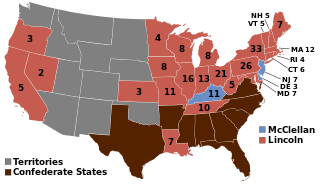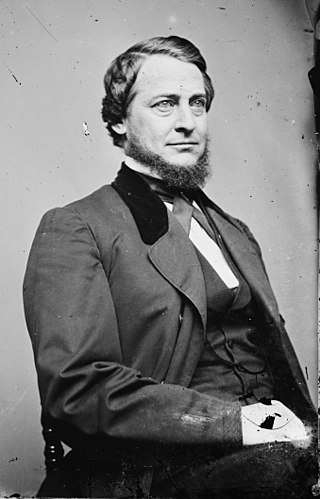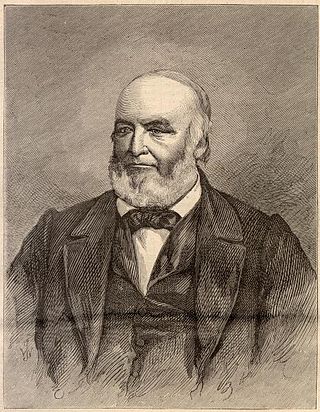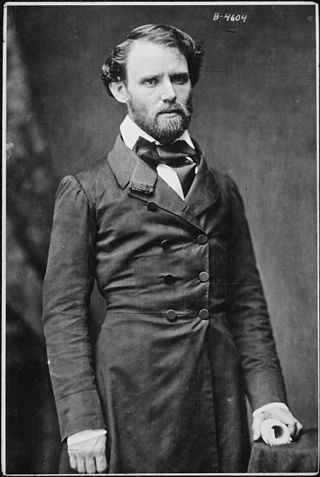
The 1864 United States presidential election was the 20th quadrennial presidential election. It was held on Tuesday, November 8, 1864. Near the end of the American Civil War, incumbent President Abraham Lincoln of the National Union Party easily defeated the Democratic nominee, former General George B. McClellan, by a wide margin of 212–21 in the electoral college, with 55% of the popular vote. For the election, the Republican Party and some Democrats created the National Union Party, especially to attract War Democrats.

In the 1860s, the Copperheads, also known as Peace Democrats, were a faction of the Democratic Party in the Union who opposed the American Civil War and wanted an immediate peace settlement with the Confederates.

Clement Laird Vallandigham was an American lawyer and politician who served as the leader of the Copperhead faction of anti-war Democrats during the American Civil War.

John Brough was a War Democrat politician from Ohio. He served as the 26th governor of Ohio during the final years of the American Civil War, dying in office of gangrene shortly after the war concluded.

David Tod was an American politician and industrialist from the U.S. state of Ohio. As the 25th governor of Ohio, Tod gained recognition for his forceful and energetic leadership during the American Civil War.

George Ellis Pugh was a Democratic politician from Ohio. He served in the U.S. Senate from 1855 to 1861.

Joel Parker was an American attorney and Democratic Party politician who served two non-consecutive terms as the 20th governor of New Jersey from 1863 to 1866 and 1872 to 1875. As a Democratic governor during the American Civil War, Parker was one of the leading critics of the Abraham Lincoln administration's domestic and military policy, though he was generally a supporter of the Union war effort. In 1868 and 1876, he was nominated for President of the United States as a favorite son by New Jersey's party delegation.
The Birchard Letter, was a public letter from United States President Abraham Lincoln to Matthew Birchard and eighteen other Ohio Democrats in which Lincoln defended the administration's treatment of antiwar agitators, and offered to release Clement Vallandigham if a majority of those to whom the letter was addressed would subscribe to three pledges in connection with the prosecution of the American Civil War.
The 1864 Democratic National Convention was held at The Amphitheatre in Chicago, Illinois.

During the American Civil War, the State of Ohio played a key role in providing troops, military officers, and supplies to the Union army. Due to its central location in the Northern United States and burgeoning population, Ohio was both politically and logistically important to the war effort. Despite the state's boasting a number of very powerful Republican politicians, it was divided politically. Portions of Southern Ohio followed the Peace Democrats and openly opposed President Abraham Lincoln's policies. Ohio played an important part in the Underground Railroad prior to the war, and remained a haven for escaped and runaway slaves during the war years.
Popular opposition to the American Civil War, which lasted from 1861 to 1865, was widespread. Although there had been many attempts at compromise prior to the outbreak of war, there were those who felt it could still be ended peacefully or did not believe it should have occurred in the first place. Opposition took the form of both those in the North who believed the South had the right to be independent and those in the South who wanted neither war nor a Union advance into the newly declared Confederate States of America.

Andrew Graham McBurney was an American Republican politician who served as the eighth lieutenant governor of Ohio from 1866 to 1868.
The Crisis was a newspaper published during the first half of the American Civil War by Samuel Medary that was critical of the American government's decision to limit slavery, and following the beginning of the war against the Confederate States of America, to wage war against the South. It was presented as the newspaper for favor with "Peace Democrats" - those northerners who sided with the Confederate cause during the war.
Ex parte Vallandigham, 68 U.S. 243 (1864), is a United States Supreme Court case, involving a former congressman Clement Vallandigham of Ohio, who had violated an Army order against the public expression of sympathy for the Confederate States and their cause. Vallandigham was tried before a military tribunal by Major General Ambrose E. Burnside for treason after he delivered an incendiary speech at Mount Vernon; he then appealed the tribunal's verdict to the Supreme Court, arguing that he as a civilian could not be tried before a military tribunal.
The New Departure refers to the political strategy used by the US Democratic Party after 1865 to distance itself from its pro-slavery and Copperhead history in an effort to broaden its political base and to focus on issues on which it had more of an advantage, especially economic ones. The New Departure theory also argued that the Fourteenth Amendment and the Fifteenth Amendment had already given women suffrage, but that argument was rejected in state and federal courts.
War Democrats in American politics of the 1860s were members of the Democratic Party who supported the Union and rejected the policies of the Copperheads. The War Democrats demanded a more aggressive policy toward the Confederacy and supported the policies of Republican President Abraham Lincoln when the American Civil War broke out a few months after his victory in the 1860 presidential election.

In the 1864 U.S. presidential election, the Democrats nominated Union Army General George McClellan for U.S. President and Ohio U.S. Representative George Pendleton for U.S. Vice President. During the campaign, McClellan vowed to do a better job of prosecuting the Union Army effort in the American Civil War than incumbent U.S. President Abraham Lincoln did. Ultimately, the McClellan-Pendleton ticket lost to the National Union ticket of Abraham Lincoln and former U.S. Senator Andrew Johnson.

The 1916 Arkansas gubernatorial election was held on November 7, 1916.

The 1918 Arkansas gubernatorial election was held on November 5, 1918.














